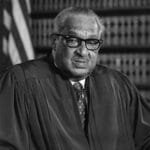 Justice Byron R. White was known for his independent and sometimes unpredictable approach to the law during his 31 years on the U.S. Supreme Court. Appointed by President John F. Kennedy in 1962, White’s legal philosophy evolved over time, making him a complex figure within the Court’s dynamic. He was one of the few justices who did not fully align with the liberal or conservative wings, often issuing opinions that defied ideological categorization.
Justice Byron R. White was known for his independent and sometimes unpredictable approach to the law during his 31 years on the U.S. Supreme Court. Appointed by President John F. Kennedy in 1962, White’s legal philosophy evolved over time, making him a complex figure within the Court’s dynamic. He was one of the few justices who did not fully align with the liberal or conservative wings, often issuing opinions that defied ideological categorization.
White was a prominent figure on the Court during the 1960s and 1970s, a period of significant social and legal change. In cases involving civil rights, his views were mixed, and his opinions reflected his nuanced understanding of the Constitution. For example, in Griswold v. Connecticut (1965), which established a constitutional right to privacy, White dissented, arguing that the Constitution did not explicitly protect such a right. However, he later supported privacy rights in Eisenstadt v. Baird (1972), which extended birth control access to unmarried individuals, demonstrating his evolving approach to issues of personal liberty.
White’s tenure was also marked by significant rulings in criminal law. In Miranda v. Arizona (1966), which established the requirement for police to inform suspects of their rights, White dissented, arguing that the decision would make law enforcement more difficult. However, in Terry v. Ohio (1968), which allowed police officers to stop and frisk individuals based on reasonable suspicion, White sided with the majority, marking him as more receptive to law enforcement concerns.
Justice White was deeply respected for his integrity, intelligence, and work ethic. His background as a former professional football player and law clerk to Chief Justice Fred Vinson gave him a unique perspective on the law. Throughout his career, White’s decisions and writings demonstrated a commitment to justice, fairness, and a balanced approach to the Constitution.






